DePaul students claim victory, Hill vows to continue writing
Students watch a speech at the pit in the Schmidt Academic Center in Lincoln Park.
On the 23rd day of Ramadan, students sat in the Schmitt Academic Center pit listening to speeches during a celebratory iftar dinner — speeches questioning how to support students that feel unsafe on campus, DePaul’s need for reform and how they felt their activism led to DePaul professor Jason Hill’s censure. But for the wider university community, it remains unclear whether Hill was officially censured and condemned by DePaul’s administration.
“It was us saying, ‘This is a really big win for us and we’re not stopping here,’” said junior Rifqa Falaneh, a board member of Students for Justice in Palestine and one of the organizers of the student coalition against Hill, which sponsored the May 28 iftar dinner.
What the group says is a win came in the form of an email statement sent to the DePaul community by Acting Provost Salma Ghanem on May 15. The statement reads in part that “professor Hill’s views are his own and do not represent the views of the university.”
Ghanem’s email statement comes after DePaul’s Faculty Council passed a resolution May 1 condemning the contents of Hill’s article in The Federalist calling for the Israeli annexation of the Palestinian West Bank, which students and professors have called equivalent to ethnic cleansing.
“I won’t be silenced,” Hill said in a phone interview with The DePaulia. “I won’t be stopped, I will continue writing my op-ed pieces, I will continue pursuing my very ambitious scholarly works.
“So they can issue formal censures or informal censures or whatever they want to call it,” Hill said. “It will not stop me and it will not prohibit me from expressing my freedom of speech in any way or form.”
Whether the May 15 email statement from Ghanem qualifies as an official condemnation from DePaul remains a matter of confusion for members of the community.
Quinn Mulroy, a member of DePaul Socialists and an organizer with the student coalition, said, “I think that’s as close as we’re going to get to an official condemnation from the university.”
“So the president has not formally censured me,” Hill said, “but there have been two organs within the university, the provost and Faculty Council, which have made statements that feels [sic] to me very much like a formal censure.”
When asked whether Hill has been formally censured by the university, Ghanem responded in a phone interview by saying, “I don’t even know what you mean by that question.”
On May 13, Ghanem and the dean of the College of Liberal Arts met with organizers from the student coalition, including Falaneh and Mulroy. According to Falaneh, the students expressed their full list of demands to the administrators, including formal censure of Hill.
“But a censure, I don’t really know what it means,” Ghanem said. “I don’t even know what they mean. I think the meeting went really well with the students. I think the students had the right to be heard. I was very impressed with the students.
“We definitely did mention it in the meeting and went over exactly what we meant by ‘censure,’” Falaneh said. “It was kind of like we had to go over that it’s not censoring, it’s censuring. She more so understood it when we put it in those terms.”
While Falaneh and Mulroy are pleased with Ghanem’s statement, they have more long-term demands of the university going forward. One of these demands is that none of Hill’s courses should be mandatory for students.
“He shouldn’t be the only option that students have,” said Falaneh.
For now, it seems like the students are finding success on this issue. According to Hill, a capstone course he was scheduled to teach in the fall has already been canceled.
“I think because students, from what I’ve heard, have been reporting that they do not want to take [my] classes,” Hill said. “One of my senior capstone classes and that class has been cancelled.”
Another demand from students is that all faculty, including Hill, be required to participate in racial sensitivity training as part of annual compliance training.
“I most certainly will not be attending a racial sensitivity training workshop,” said Hill. “Emphatically not. You can quote me on that, because I’m not a racist, and I think it’s a completely inappropriate, outrageous, almost mysterious claim.”
In Ghanem’s statement, she also mentions that “the article by Professor Hill has also brought out the other extreme and emboldened some to hide behind the cloak of social media anonymity and attack our students and faculty on the Internet.”
According to Falaneh, student organizations have been receiving threats over Twitter.
One tweet Falaneh identified to The DePaulia as a threat reads, “REAL Americans support Prof Jason Hill. We know that SJP is nothing but a racist, terrorism-supporting organization, and we look forward to new laws that put SJP in the same category as Hamas, Hezbullah, Nazis and other vermin.”
After reading Ghanem’s statement, Hill said he hadn’t heard of any harassing messages on social media towards the organizers. “I have no idea what she’s talking about,” Hill said. “I can only speak to the harassment that I have faced and the harassment that certain Jewish students have expressed to me privately.”
“I can’t speak to online harassment,” Hill said. “My physical safety was threatened on campus.”
“I think it’s very ironic what he’s saying,” Falaneh said. “He’s kind of making us, the students at DePaul, the ones who are inciting this violence, whereas he’s the one who published this article, and that whole article is inciting ethnic violence and inciting genocide.”
The same day that students staged an anti-hate rally outside Arts and Letters Hall to support students that felt unsafe, Hill appeared on Tucker Carlson’s Fox News show to discuss the protests.
“Who was made to feel unsafe here?” Hill told The DePaulia. “The professor who wrote an article and needed [police] protection, or the students who claimed to feel unsafe but were free to roam around campus and take over buildings with impunity?”
“Right after that interview, we got a bunch of threats on our social media outlets,” Falaneh said.
For now, Falaneh and Mulroy will continue organizing with the student coalition to pursue their long-term demands, such as mandatory racial sensitivity training for all faculty and the clear availability of student resources for reporting discrimination in the classroom.
“Let’s recognize this win and keep going,” Falaneh said.
“I think they’re missing one important fact,” Hill said. “Whatever they’re taking offense to, that’s protected by free speech. I think this is what’s missing.”


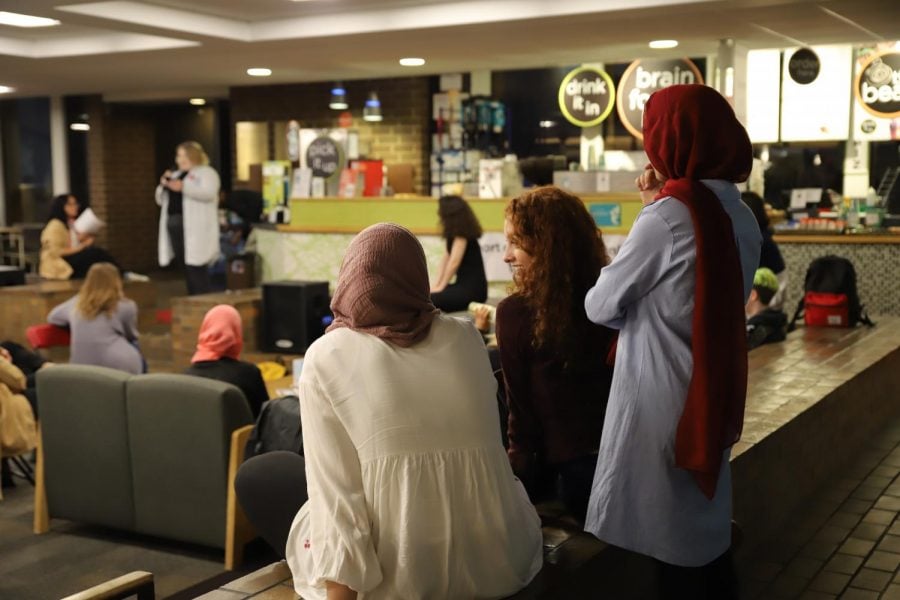

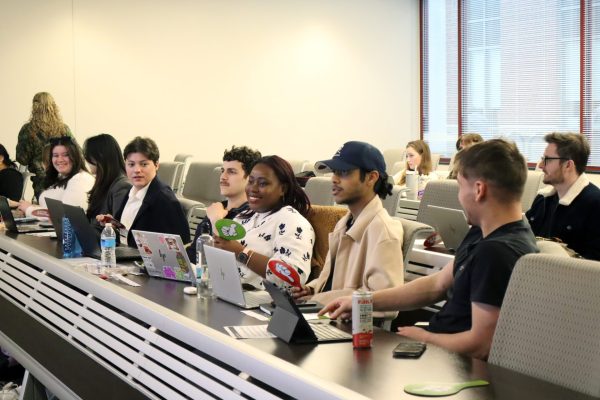
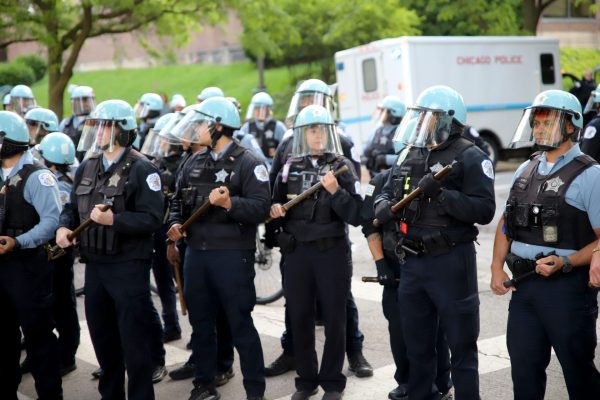
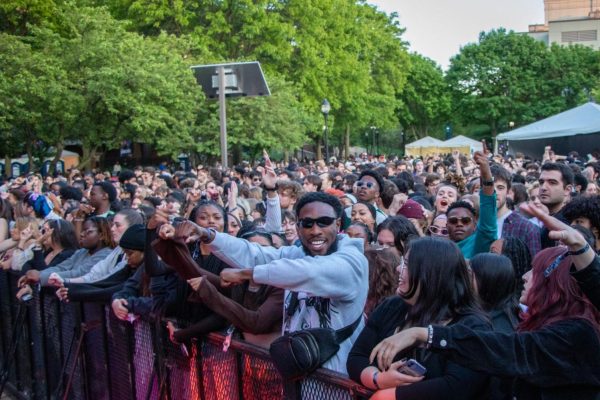
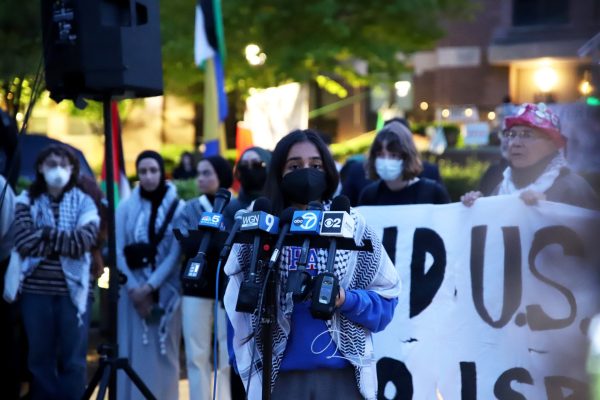




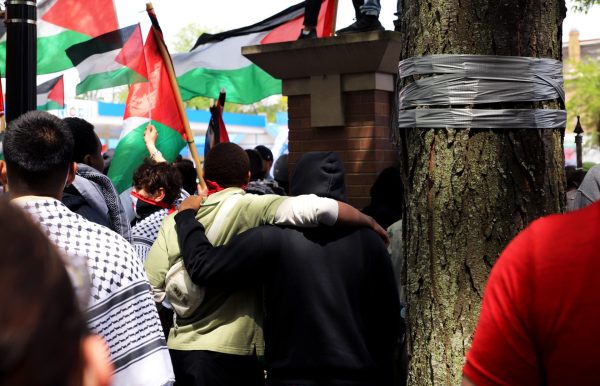
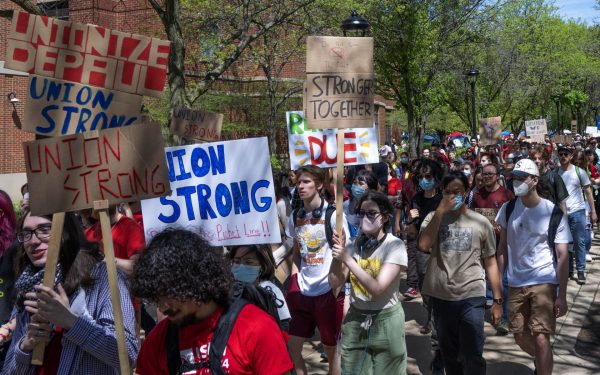
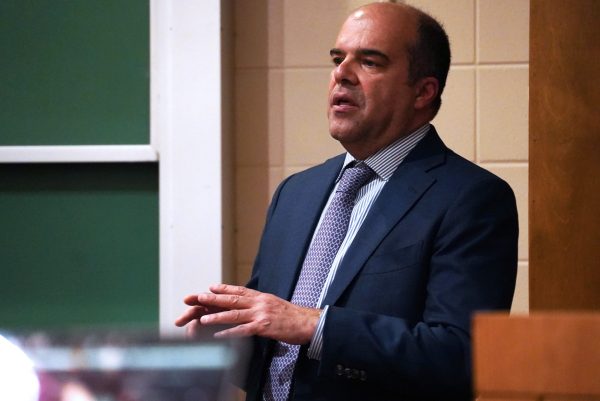


Fern G • Jul 2, 2019 at 6:40 pm
The following article was difficult to read. It is not because of my English skills – its because of what the Palestinian leadership is doing to its own people.
https://www.jpost.com/Middle-East/Hebron-businessman-who-attended-Bahrain-tells-Post-Im-afraid-for-my-life-594257
This is very much in line with the warm reception Professor Hall received for having a different viewpoint.
I dare say this on-going effort to prevent anyone from helping the Palestinian people with their own problems is the real problem. It’s a massive PR campaign coupled with incitement and fear. Now the students of Depaul and your faculty are part of the problem.
Who will be brave enough to stop this dangerous charade – one in which the rank and file of the Palestinians are the most cruelly impacted?
Joe Moran (MBA1959) • Jun 12, 2019 at 9:45 pm
To Mr. East and anyone in the DePaul Community interested enough to read this:
I have a love of free speech and unfettered dialogue, an abhorrence of intellectual censorship, and I especially have have pure disgust with arguments by sloganeering, insults, pompous pontificating, or conclusion sans backup argumentation.
Stifling or not tolerating free expression of viewpoint is especially antithetical in a learning place, AKA DePaul, whether by those in a power position, e.g. teachers, administrators, faculty committees, intimidating groups of students, faculty, random mobs predisposed to shout down non-acceptable views, or those who might simply feel offended (that’s offended, not threatened, by the bye).
Whether I agree or disagree with Professor Hill’s, your’s, or anyone else’s opinion, is totally irrelevant. I did, incidentally, read his article on why we might non-fund some universities. What did you find that should lead one to somehow prohibit publication of Prof. Hill’s argument? Why would we not welcome the person that forces us to think through an issue better. As learners, we simply must respect well-crafted argumentation – else how do we gain wisdom?
In a university setting, we should not have sympathy for pronouncements, i.e, those who espouse or condemn without accompanying rationale. Who would not love to hear Chairman Mao or Mr. Maduro, Heinrich Himmler, Lt. Calley, any participant of the No Gun Ri horror, or Gina Haspel explain why they were convinced what they did was OK? If anyone connected to the DePaul community feel such views should not be publishable or openly presented and discussed in this ‘learning environment’, tell me why.
As Pope Francis has so aptly said: DIALOGUE, DIALOGUE, DIALOGUE.
Joe Moran (MBA 1959)
Joe Moran (MBA 1959) • Jun 10, 2019 at 1:51 pm
Mr. Paul East posted, on June 9, in the DePaulia the following: “Jason D Hill will likely face little to no consequence for his writings”. Mr. East – a critical question of academic ethics: Should he? If yes, pray tell, why? What is the intellectual line one may not cross in freely expressing a view, or are there changing lines, depending on who might be offended?
A teacher MUST NOT be an advocate, activist, campaigner, propagandist, or promoter for a private cause in the classroom or in her/his teaching role, either through clever nuance or flat-out blatant advocacy. A professional teacher presents competing rationales, so that the school is a place of thinking and learning, not a closed society where future acolytes are indoctrinated to carry on the teacher’s personal beliefs. As long as this stricture is not breached, no ‘consequence’ should be imposed by superiors, colleagues, … or, most importantly, by students.
I will end with an educational truism for all DePaul teachers and students – ‘EVERYONE has a God-given, (and constitutional) right to be offended; NO ONE has a right not to be offended’.
So, a suggestion: how about an online forum where current DePaul denizens might engage (intellectually – minus boorish behavior) with DePaul alums (188,000 of us) on important societal issues? There are workable mechanisms to do this.
Who knows, we might all learn something from one another. My, what an interesting – and, unfortunately, novel – thought!
Joe Moran (MBA 1959)
Paul East • Jun 9, 2019 at 8:42 pm
Jason D Hill will likely face little to no consequence for his writings. He has sided with those who have enormous resources. He will be well cared for. The only concern Hill will have is living with himself.
Not the same for former Depaul professor Norman Finkelstein, a brave soul who’s only sin was to criticize the same ethnic cleansing that Hill openly advocates for. You can read up on what happened to him.
Two case studies which make quite clear who is allowed to say what on college campuses. Though the status quo on this issue may not last for long.
Good luck to the students.
– Paul
Joe Moran (DePaul MBA 1959) • Jun 8, 2019 at 3:05 pm
I read Dr. Hill’s article – several times. I marvel that some students felt “unsafe” by his comments. “Unsafe”. Really? One wonders why it didn’t simply provoke discussion and research. Strangely, in this learning-place, many students have asked for, nay, ‘demanded’, “racial-sensitivity” classes for ALL faculty. Plus, of course, Prof. Hill must be “censured’. Why? Well, because he expressed his views in a magazine – and that made for ‘discomfort and angst’ among a few students and professors.
So why, pray tell, did they come to DePaul? College must be a time for intellectual discomfort (angst, too), not mind-numbing intellectual-dreck, foot-stamping, and shouting. Else, why should DePaul even exist? And why would real students even want to be there? Advice from an alum: Question Everything, intellectually, even (perhaps especially) your own absoluteness. Why? How about –To THINK; maybe, just maybe, even LEARN!
Oddly, DePaul’s Acting Provost purportedly stated: “Professor Hill’s views… do not represent the views of the university”. So what! Is hewing to perceived ‘official’ views a requirement? I hope it has not come to that. IDePaul, the largest Catholic University: Consider Christ, as a young boy, engaging in the hurly-burly of hard dialogue, questioning, in public, in a patriarchal society, the Jewish Elders who, to their credit, engaged back, even though uncomfortably challenged by this young ‘outsider’. Result: the world changed. And from a more recent venue; a quote from Pope Francis: “In dialogue everybody wins, and no-one loses”.
Sadly, DePaul’s ‘Faculty Council’ willingly authored the ‘censure’. Also sadly, it only published conclusions, sans ANY written rationale. Consider the censure language: 1) “misrepresents the history”; 2) “Distorts the facts”; 3) “promotes racism”; 4) “advocates for war crimes and ethnic cleansing”. To condemn, without explanation, is flat-out unprofessional, plus a shabby use of power – by teachers – in a teaching-venue, no less.
So, DePaul Faculty, AKA teachers(?), why no documentation to back your absolutist conclusions? Are we to simply accept because of your status? Is J’accuse enough these days to ‘convict’?
Finally, from an alum of considerable vintage, I offer, for guidance of current DePaul denizens:
(credits: to a prescient singer-philosopher from way back in 1969, one Ms. Peggy Lee. )
“Is that all there is… (to a DePaul education)? If that’s all there is, my friends, then let’s keep dancing. Let’s break out the booze and have a ball – if that’s all…
there is.”
Finally (one last ‘finally’). A proposed DePaul motto –
Borrowed from a 1960s student protest-rant (modified a bit).
LEARN, BABY, LEARN!
Joe Moran (MBA 1959)
Gary Katz • Jun 6, 2019 at 4:39 pm
Let’s see which side of the conflict comports more closely with the values of DePaul students: 1. One side abuses gays and tolerates harassment of Christians. 2. One side’s leader vowed that nobody from the other side would be allowed to live in their land. 3. One side has a death penalty for anyone who sells his land to the other side. 4. One side rewards anyone who murders or maims any member of the other side, even if the victim is an old woman or child. 5. One side teaches young children that the other side is inferior and must be killed. 6. One side celebrated 9/11, unlike the other side, which built a memorial to the almost 3000 victims of 9/11. If you think the above is good, then you should ally yourself with the Palestinians. If you think the above is awful, you are (or should be) on the side of Israel. Forget propaganda and slogans, unless you like being a sucker, easily manipulated like you just joined a cult. Follow PMW or CAMERA. Get facts, not lies. Find out what is said, in Arabic, by Palestinian leaders to their people, not what they say to Westerners, in English. You deserve the truth. Don’t you want the truth? It’s not what you’ve been indoctrinated to believe. Don’t believe a single word spoken by SJP, JVP, Electronic Intifada, etc. Think for yourselves.
Charlene Underly • Jun 6, 2019 at 6:04 am
That is censorship of Professor Hill, when does a group of students tell a University who too censor. What happen to Freedom of speech. I’m appalled at our Universities taking sides with the Pro Palestine’s and terrorizing Jewish students. What world do we live in, that anti semitism has became the rage for academia.
Mark McIntire • Jun 5, 2019 at 12:29 pm
Good for Professor Jason Hill.
In the face of student brats only after suppression of his free speech and academic freedom protections, Doctor Hill stands up and defies the racist Muslim mob seeking to silence his defense of the sovereign state of Israel
Professor Hill is not only a scholar but a true defender of freedom. He is the victor in this kerfuffle not the brats who seek to destroy him
Professor Mark McIntire
SBCC Philosophy Department, Retired
Charles Negy • Jun 3, 2019 at 11:23 am
Students demanding racial sensitivity training? Sounds like Chinese indoctrination camps to me—in which attendees will learn that anti-Israel groups are sacred cows, never to be challenged for their beliefs or attitudes. Clear case of racist students and professors projecting their racism on those who have an opinion about the Israel-Palestine conflict with which they disagree.